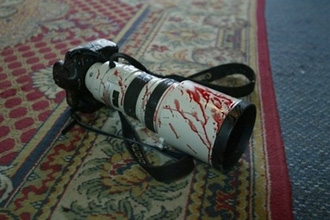
|
 |
 |
 Travel Writers' Resources | May 2008 Travel Writers' Resources | May 2008  
Rights Group Highlight Threats in Europe on Press Freedom Day
 Agence France-Presse Agence France-Presse
go to original


| | The camera of an injured photographer lies covered with blood in Baghdad, 2003. Gunmen dragged a woman freelance journalist from a taxi in Iraq's northern restive city of Mosul on Sunday and killed her in broad daylight. (AFP/Patrick Baz | | |
Paris — Media rights campaigners Reporters Without Borders (RSF) marked World Press Freedom Day Saturday by highlighting threats to journalists' safety inside Europe.

Elsewhere meanwhile, journalists and international organisations highlighted what they said were attacks on media rights in Africa, Asia and Latin America.

RSF's new report on the media rights situation inside the EU acknowledged: "There is genuine press freedom within the European Union."

"No state has ordered the murder or imprisonment of a journalist and state censorship is a thing of the past."

But it highlighted problems of security faced by some journalists in several western European countries including France, Denmark Italy, Northern Ireland and Spain.

In France, journalists covering the violence on the French Mediterranean island of Corsica had become used to threats and harassment from nationalist militants there, said the report.

In recent years however, those covering unrest in the deprived urban had also been assaulted, with "scores" of photographers, cameramen and reporters "physically manhandled" during the November 2005 unrest, it added.

In Italy, the threat comes from organised crime: the Camorra in Naples, the 'ndrangheta in Calabria, Cosa Nostra in Sicily and Sacra Corona Unita in Puglia.

"Around a dozen journalists work under police protection (...) Every journalist who writes about the mafia gets a message sooner or later, a signal warning that they are being watched," it added.

In Spain's Basque Country, journalists have come into conflict with the Basque separatist militants ETA.

In Northern Ireland, reporters "continue to receive death threats, despite the peace process of the last few years and the formation in 2007 of a regional power-sharing government made up of former Unionist and Republican enemies," RSF added.

Arguably the highest-profile case comes from Denmark, where intelligence services said in February they had uncovered a murder plot against Kurt Westergaard.

It was he who drew the most controversial cartoon of the Prophet Mohammed, which triggered a wave of protests around the Muslim world.

"He has since been forced to live under the protection of the Danish secret services, changing his residence every two weeks," the statement underlined.

Individual journalists and media organisations and around the world used World Press Freedom Day to highlight abuses of press freedom.

In Tunisia the editor and director of opposition weekly newspaper Al-Mawkif have been on hunger strike since April 26.

"We are determined to continue our protest until the end of the pressure against Al-Mawkif," Rachid Khechana and Mongi Ellouze told reporters Saturday.

Tunisia's President Zine El Abidine said in a statement to journalists and press barons that he was doing all he can to "guarantee" a national press that was "advanced and intrepid."

"We have always considered freedom of expression as a fundamental human right," he added.

In Gambia, the authors of book honouring Deyda Hydara, a prominent journalist assassinated more than three years ago, chose World Press Freedom Day to launch their biography.

"Deyda's story needs to be known," said Demba Ali Jawo, one of the co-authors of "A Living Mirror".

Hydara, 58, was the co-founder of The Point newspaper and also worked as a correspondent for Agence France-Presse and for the media rights organisations Reporters Without Borders (RSF).

He was shot dead in his car on the night of December 16, 2004. His murder remains unsolved.

The World Association of Newspapers on Saturday issued a statement denouncing what it called China's broken promises regarding human rights reforms ahead of the Olympic Games.

"Despite promises of reform made ahead of the Beijing Olympics, the Chinese authorities have not only failed to respect them, but they have intensified their crackdown on journalists and others who seek to exercise their right to freedom of expression," wrote WAN chief executive Timothy Balding.

UNESCO, the UN cultural organisation, honoured Mexican journalist Lydia Cacho Ribeiro for her coverage of political corruption, organized crime and domestic violence in Mexico. They awarded her the 2008 UNESCO/Guillermo Cano World Press Freedom Prize.

Cacho, a freelance investigative journalist writing for the La Voz del Caribe daily, has already won awards for her coverage of the murders of hundreds of young women in the northern Mexican city of Ciudad Juarez.
'Predators of Press Freedom' Identified
UPI
go to original

Paris-based Reporters Without Borders Saturday released an updated list of the "predators of press freedom" for World Press Freedom Day.

The group said former Cuban dictator Fidel Castro is off the list after turning over power to his brother because of health problems. A U.S. ally, Pakistani President Pervez Musharraf, also is off the list, having "lost February's parliamentary elections and, in the process, his ability to harm press freedom," the group said.

Ten new "predators" have been added to the list. The armed wing of Hamas in Gaza and the Palestinian Authority's security forces in the West Bank "were guilty of serious press freedom violations," the group said, and each "faction systematically hounded journalists suspecting of siding with the other camp."

Also added were the Israel Defense Forces. Reporters Without Border said the IDF began to target journalists covering Israeli incursions into Palestinian territory, and a Palestinian cameraman working for Reuters was killed in April by an Israeli tank shell.

The group said the complete list of "predators" is accessible on www.rsf.org. | 
 | |
 |



